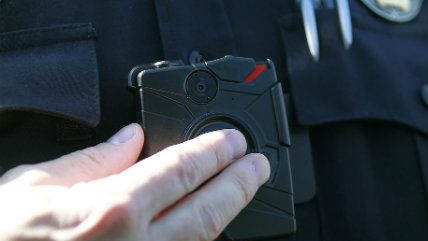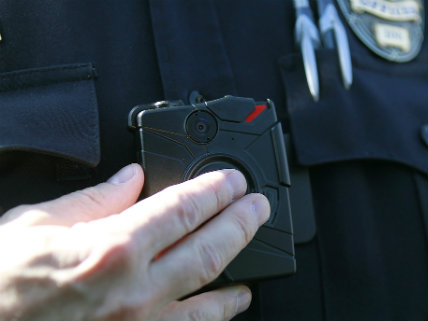Pennsylvania Governor Vetoes Bill To Keep Names of Police Officers in Shootings Secret
"I cannot allow local police department policies to be superseded and transparency to be criminalized."


Democratic Pennsylvania Gov. Tom Wolf vetoed a bill Monday passed by the state legislature that would have barred public officials from releasing the names of police officers involved in shootings of civilians for 30 days or until an internal investigation was completed.
The bill sailed through the state legislature in October with heavy support from Republicans—as well as local, state, and national police unions—but Wolf said in a veto statement Monday that "government works best when trust and openness exist between citizens and their government, and as such, I cannot sign into law a policy that will enshrine the withholding of information in the public interest."
"These situations in particular—when law enforcement uses deadly force—demand utmost transparency, otherwise a harmful mistrust will grow between police officers and the communities they protect and serve," Wolf continued. "Further, I cannot allow local police department policies to be superseded and transparency to be criminalized, as local departments are best equipped to decide what information is appropriate to release to the public."
While high-profile police shootings over the past several years have led to wide-sweeping transparency and reform efforts, they have also led to several states, such as North Carolina, to restrict access to body camera footage and public records involving fatal incidents. As my Reason colleague Anthony Fischer wrote in October, shortly after the bill passed:
The bill sailed through Pennsylvania's House 151-32 and 39-9 in the Senate, with a significant amount of Philadelphia-area lawmakers voting against it, according to Philly.com […]The bill was introduced by Rep. Marina White (R) as a means of providing officers involved in shootings "basic protection from threats" After voting in favor of the bill, Rep. Dominic Costa (D) declared, "We are the protectors of our protectors."
Last year, then-Philadelphia Police Commissioner Charles Ramsey changed the department's long-standing policy of releasing officers' names whenever it felt it was appropriate to limiting the delay to a maximum of 72 hours. Ramsey was quoted by NPR as saying, "I don't think you can shoot someone and expect to remain anonymous…and I do think that we have a responsibility as a police agency that work[s] for the people to provide that information, unless there are some extenuating circumstances."
Reggie Shuford, executive director of the American Civil Liberties Union of Pennsylvania, said the bill was introduced as "backlash to the grassroots movement of people calling for fairer treatment by the police" and applauded Wolf for vetoing it.
"By rejecting this bill, Governor Wolf took a stand for transparency and accountability," Shuford said. "This legislation would have taken us backwards, at the exact time that people are increasingly calling for more openness and fairness from police departments. There is nothing fair or open about withholding information from the public after someone has been injured or killed by an employee who is on the taxpayers' payroll.
Editor's Note: As of February 29, 2024, commenting privileges on reason.com posts are limited to Reason Plus subscribers. Past commenters are grandfathered in for a temporary period. Subscribe here to preserve your ability to comment. Your Reason Plus subscription also gives you an ad-free version of reason.com, along with full access to the digital edition and archives of Reason magazine. We request that comments be civil and on-topic. We do not moderate or assume any responsibility for comments, which are owned by the readers who post them. Comments do not represent the views of reason.com or Reason Foundation. We reserve the right to delete any comment and ban commenters for any reason at any time. Comments may only be edited within 5 minutes of posting. Report abuses.
Please to post comments


He probably thought he was vetoing a tax break for Keystone Staters. Seems like this will be overridden.
Hey, apropos of the picture on the story, maybe we should pass a law making tampering with the body camera the same penalty as tampering with a smoke detector on an airplane.
Cops are always looking get/take more than they are entitled to and are incorrigible in their efforts to do so.
Yeah, the governor just not getting it that badges grant extra rights. Didn't he get the memo. He must hate those citizen shooting heroes and does not want them safe to enjoy their paid vacations while the public ruminates over their murderous ways.
Ok, I will forgo my right to call the police since I am a detractor and no longer worthy of summoning the servant. Happy. I feel safer already.
"No State shall enter into any Treaty, Alliance, or Confederation; grant Letters of Marque
and Reprisal; coin Money; emit Bills of Credit; make any Thing but gold and silver Coin
a Tender in Payment of Debts; pass any Bill of Attainder, ex post facto Law, or Law
impairing the Obligation of Contracts, or grant any Title of Nobility."
- US Constitution, Art 1, sec. 10
The problem is, who has standing to sue when a State does grant privleges that amount to Titles of Nobility for cops?
Call me when "Officer" is hereditary. Until then, the problem is relatively well constrained.
WTF? Somebody doesn't know what 'title of nobility' means. And they're obviously rich and white. The rest of us have to worry about being shot.
As to "Officers" of any governmental assignation, I often wonder to what extent the 'rich' subset overlaps the 'graft' subset. Considering your sarcasm seriously for a moment though, there is a weak argument along the lines of 'life peer' I suppose.
Titles of nobility mean and refer to special privileges and goodies for the king's men. The meaning of the phrase is not cabined by considerations of heredity.
Hence the life peer argument above. Life peerages are not hereditary. It is a weak argument because, among other considerations, you would have to accept that a Legislature is the fons honorum and thus capable of investing a peer. Mere privileges do not a peer make.
Hence the life peer argument above. A life peerage is not hereditary. It is a weak argument because, among many other reasons, it requires one to accept that a Legislature is the fons honorum. Mere privileges do not a peer make.
The various "no titles of nobility" clauses in the Constitution also apply to non-hereditary knighthoods.
Oh no, the warrior caste isn't getting more protections?!?! I bet they'll not protect you from themselves next time something bad happens!
Well, shit. Now Wolf's done something I actually have to support. Something this Pennsylvanian thought would never happen.
Good for him.
Precisely the first thing he's done since taking office that I've remotely approved of. It's hard for me to believe that this represents some sort of principled stance, as opposed to pandering to urban activist constituencies, but I'll try to keep an open mind. And, of course, or system of government is supposed to be about checks and balances and controls so that purity of heart doesn't matter.
I've made $64,000 so far this year working online and I'm a full time student. Im using an online business opportunity I heard about and I've made such great money. It's really user friendly and I'm just so happy that I found out about it. Heres what I do,
------------------ http://www.Nypost55.com